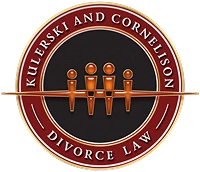
Paternity Lawyer in DuPage County, Illinois
Establishing paternity is a critical step in many family law matters involving children. Whether you are a mother seeking financial support for your child or a father looking to protect your parental rights, the legal determination of paternity can have long-lasting effects on your family and your future. At Kulerski & Cornelison, attorney Kari Cornelison provides experienced legal guidance to clients throughout DuPage County who need help establishing or disputing paternity.
With years of experience handling Illinois family law matters, Kari understands that paternity cases are often emotional and complex. Her approach is practical, straightforward, and focused on protecting both parental rights and the best interests of the child.
Need Help Now?
What Is Paternity and Why It Matters
In Illinois, paternity refers to the legal recognition of a man as a child’s father. When parents are married at the time of the child’s birth, the law generally presumes the husband is the legal father. When parents are unmarried, paternity must be established voluntarily or through legal action.
Without a legal determination of paternity:
- A father may not have enforceable parenting time or decision-making rights
- A child may not have access to child support, benefits, or inheritance rights
- Either parent may lack legal protections related to the child
Establishing paternity benefits both the child and the parents. For children, it ensures access to financial support, health insurance, Social Security benefits, inheritance rights, and important family medical history. For parents, it creates a legal framework for parenting time, parental responsibilities, and child support.
How Paternity Is Established in Illinois
There are several ways to establish paternity under Illinois law, depending on the circumstances.
Voluntary Acknowledgment of Paternity
One way to establish paternity is by signing a Voluntary Acknowledgment of Paternity form. This is often done at the hospital after a child is born, but it can also be completed later. Both parents must agree to sign the form, which gives the father legal recognition along with parental rights and responsibilities.
Administrative or Court-Ordered Paternity
If paternity is not voluntarily acknowledged, it may be established through:
- An administrative order issued by the Illinois Department of Healthcare and Family Services
- A court order entered in a DuPage County family court
In contested cases, either parent may file a paternity petition. The court may order genetic testing if there is a dispute regarding the child’s biological father. Once paternity is established, the court can issue orders addressing child support, parenting time, and parental responsibilities.
Paternity Disputes and Litigation
Paternity disputes often involve strong emotions and sensitive issues. Mothers may pursue paternity actions to secure financial support for a child, while alleged fathers may contest claims or seek legal recognition to protect their relationship with the child.
At Kulerski & Cornelison, Kari Cornelison represents both mothers and fathers in DuPage County paternity cases. Her focus is on protecting her clients’ rights while prioritizing the child’s best interests.
In some situations, a presumed or previously acknowledged father may seek to challenge paternity based on new information. Illinois law allows a Voluntary Acknowledgment of Paternity to be rescinded within a limited timeframe or under specific legal circumstances. These cases can be complex, and experienced legal guidance is critical to navigating them properly.
Rights and Responsibilities After Paternity Is Established
Once paternity is legally established, the father has the same rights and responsibilities as if the parents were married at the time of the child’s birth. These rights may include:
- The right to seek parenting time
- Participation in decisions involving the child’s education, healthcare, and welfare
- Legal standing in custody-related matters
Paternity also brings responsibilities, including the obligation to provide financial support. Courts in DuPage County determine parenting time and parental responsibilities based on the best interests of the child.
Kari helps clients develop parenting plans that reflect their child’s needs and support long-term stability. Whether through negotiation or litigation, she works to resolve paternity-related issues in a way that promotes consistency and healthy family relationships.
Additional Issues in DuPage County Paternity Cases
Paternity matters often overlap with other family law issues, including:
- Child support establishment or enforcement
- Allocation of parental responsibilities
- Parenting schedules and holiday arrangements
- Health insurance coverage
- Disputes involving parents living in different counties
When complications arise, such as lack of cooperation or cross-county jurisdiction issues, Kari provides clear guidance on available legal options. She is familiar with the procedures used by the Illinois Department of Healthcare and Family Services and the DuPage County court system.
For many fathers, establishing paternity is an important step toward building or maintaining a meaningful relationship with their child. For mothers, it is often necessary to ensure financial stability and consistent support. No matter your situation, Kari provides personalized advice and strategic representation.
Why Work With Kari Cornelison
Kari Cornelison focuses her practice exclusively on family law and has extensive experience handling paternity cases throughout DuPage County. She understands the emotional and legal challenges involved and approaches each case with care, professionalism, and attention to detail.
From her Oak Brook office, Kari serves clients across DuPage County, including Naperville, Wheaton, Downers Grove, Hinsdale, Clarendon Hills, Lombard, and surrounding communities. Clients value her clear communication, practical advice, and commitment to protecting both parental rights and children’s well-being.
Serving Clients Throughout DuPage County
Kulerski & Cornelison represents parents throughout DuPage County who need help establishing or disputing paternity. Whether your case involves a newborn child or a dispute that arises years later, Kari provides steady guidance at every stage of the process.
Contact Kulerski & Cornelison
If you are dealing with a paternity issue in DuPage County, it is important to act promptly. Legal decisions made early in a paternity case can affect parenting rights, financial obligations, and your relationship with your child for years to come.
Contact Kulerski & Cornelison today to schedule a confidential consultation and discuss your options with attorney Kari Cornelison.



